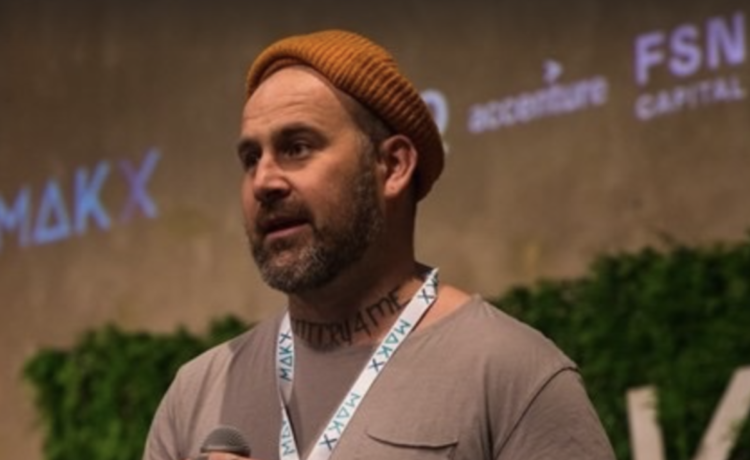Last summer, when I met Daniel Dart for the fourth or fifth time, he told me he’d just finished getting two master’s degrees at the London School of Economics and was at the MIT Sloan School of Management to get an MBA. He was also starting a venture capital fund backed by some prominent investors and getting informal advice from titans of finance including Josh Friedman, John Arnold, Jack Selby, and Gary Cohn.
It’s not unusual to meet that sort of overachiever at financial events like the one I was attending, a confab in northern Maine sponsored by David Kotok of Cumberland Advisors, to get story ideas from business and financial leaders.
Except for one thing: Daniel Dart is an ex-con who spent roughly four years in prison for shoplifting, car theft, and carjacking, and never earned a high school diploma or bachelor’s degree. He was also homeless for more than a year, and could easily have ended up dead on the streets, a bleak and ultimately forgotten statistic.
I asked Daniel Dart to fill me in on his story. We sat on a rustic deck overlooking West Grand Lake, 15 miles from the Canadian border. He wore saggy hip-hop pants and an MIT T-shirt. I popped a beer. He drank a seltzer. Dart can be an imposing sight, if not smiling. He’s stocky and tall, with tattoos lining his hands, arms, and neck, and a signature beanie normally perched atop his shaved head. He’d have the menacing air of a Hell’s Angel, if he didn’t laugh frequently at parts of his tale that seem ridiculous and crazy, even to him, as he looks back. Also, he’s a hugger.
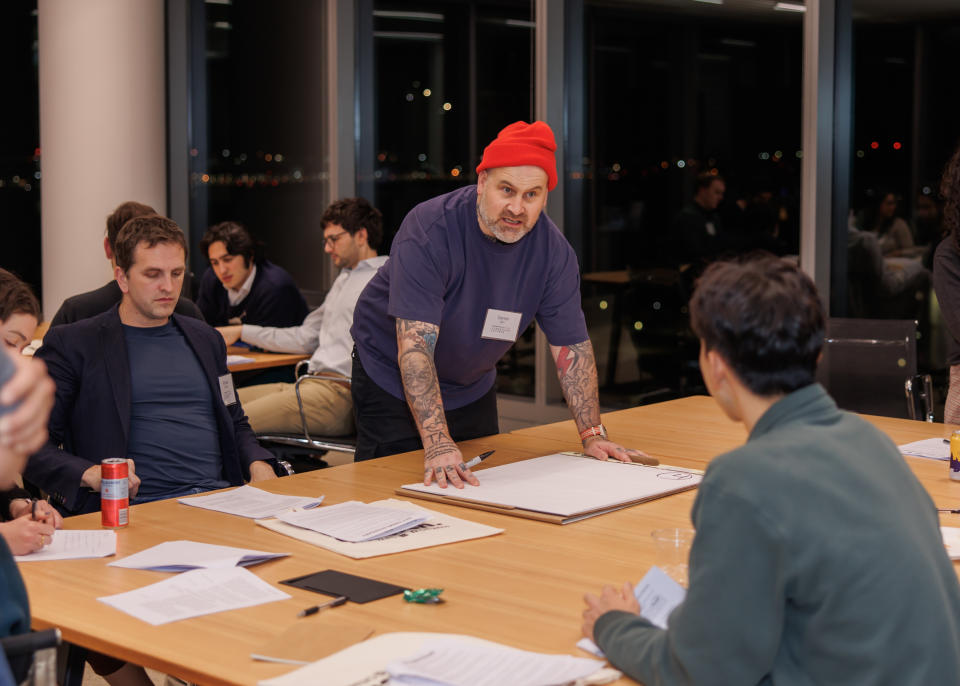

Dart talks fast and freely, his delivery punctuated by regular F-bombs. There’s always another crazy story he forgot to mention. He briefly acknowledged his jail time but then moved on to his role helping manage the hit band Weezer and other name-brand musicians. He knew celebrities such as actor Mark Duplass and Tom Colicchio of Top Chef. He collaborated with the Obama White House. The United Nations hired him. He was in Gaza, then Saudi Arabia, then at the London School of Economics, then at MIT. Oh, and Gary Cohn, vice chairman of IBM and former president of Goldman Sachs, was helping him launch a venture capital fund.
It was either the wildest success story ever or an elaborate scam. We got interrupted, and other events dominated the rest of the gathering. But I made a note to dig deeper and try to figure out if Daniel Dart was on his way to becoming one of the unlikeliest players in the otherwise stuffy world of finance.
He had invited me to visit him at MIT, so in November I traveled to Cambridge. I tagged along to a couple of events and recorded several hours of interviews. Then I checked out what I could and tried to nail down the facts.
Here’s the remarkable saga of 42-year-old Daniel Dart.
Childhood in the East Bay Area, in California, was rough. He doesn’t want to discuss the details publicly, as he has an improving relationship with his parents, who have been married for 52 years. Here’s the sanitized version: “It was a very tumultuous home,” Dart says. He was the youngest of three kids, with a mom who worked at a hair salon and a dad who ran a building supply store, where one section was known as the “rock yard.”
He remembers feeling unwanted. There were suicidal thoughts as young as 5. He tried running away. Approaching teenage years, Dart rarely went to class. One semester, his grade point average plummeted all the way to 0.0. At age 13, his parents sent him to a military school, which he describes as “just a sh*t show” where ”everybody was getting in trouble.” Yet his GPA shot up to 4.1. He came back home after two years and his GPA dropped back to 0. Then his parents sent him to the Provo Canyon School, later exposed as a hotbed of abuse for decades. “They’d strip me naked for three days, for misbehaving,” Dart recalls. “By this point I didn’t belong anywhere. I was a feather in the wind.”
Drop Rick Newman a note, follow him on Twitter, or sign up for his newsletter.
By the time Dart finished at Provo, he was into drugs — heroin, coke, crack, weed, lots of drinking — and hanging out with like-minded rebels, including some he met at military school, where mostly everybody belonged to one gang or another. He wasn’t talking with his parents and couldn’t move back home. He knew some people in San Diego and applied to San Diego State University (SDSU), which accepted him.
Shortly before school began in the fall of 1999, he was at a party and decided to go on a beer run. He saw some keys on a counter, picked them up, went outside and clicked the fob until he found the Honda Accord they belonged to. A couple other guys went with him. Dart returned to the party with the beer, but the other guys went joyriding and crashed. They told the cops Dart helped them steal the car, and an arrest warrant went out.
Two weeks later, Dart needed money and got caught stealing an MP3 player at Fry’s Electronics. Authorities charged him with both crimes—car theft and shoplifting—and an apathetic public defender told him to plead guilty to two felonies, in exchange for a reduced sentence of about six months. “SDSU was out the window,” Dart says. “Within two months of turning 18, I was in jail.”
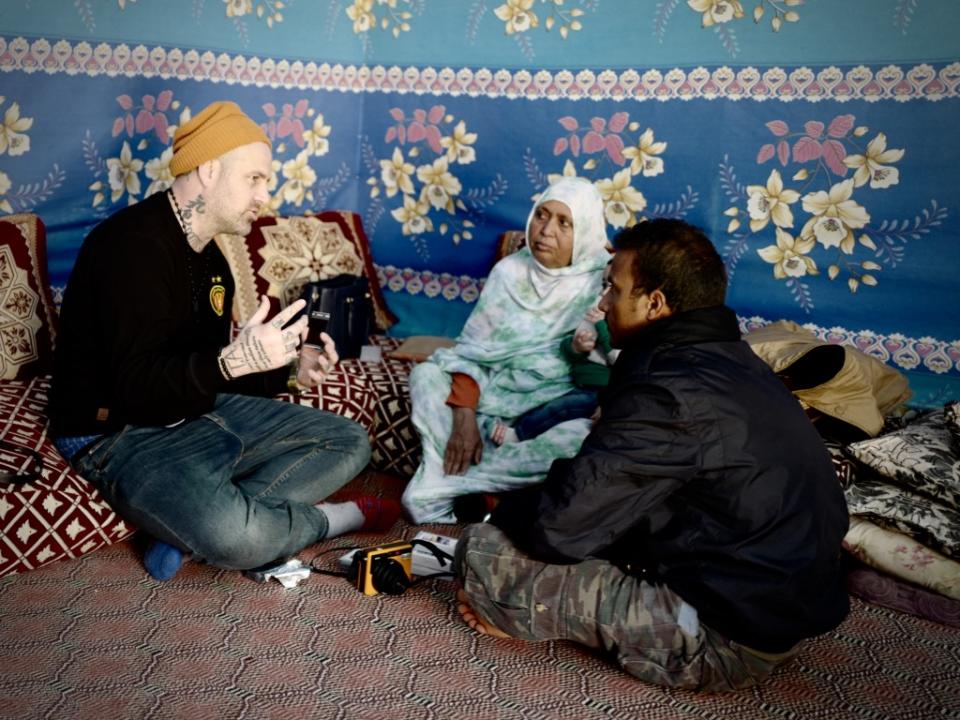

After he got out in 2000, he had nowhere to go and the college opportunity had vanished. “It was so dysfunctional,” Dart says, laughing at his own predicament. “I floated down by the beach. I asked for change. I slept on the beach. I knew where I could get a pasta dinner on Wednesdays. I kinda had a routine.”
Around this time, a childhood friend heard from another friend who had run into Dart in San Diego. “She told me he looked like he was gonna die,” the childhood friend recounted in a phone interview. “He was skinny, with his eyes popped out. This was probably when he was heaviest into drug use.”
Some friends convinced him it was better being homeless in Los Angeles than in San Diego, so he went there. He got jobs: at a café, a sub shop, a telemarketing firm. He got a dilapidated apartment with three other guys, no fridge, and just one working electrical outlet. He reconnected with people from reform school and resumed gang affiliations that started there. He tatted up, much of the ink drawn by amateurs in somebody’s living room.
In 2002, a friend, Steven, got in a row with a rival gang, and ended up shot dead. Another night, somebody fired a shot into Dart’s building. Anticipating a gang war, Dart started carrying a gun. He was drinking one night, and another friend called him out of the bar for something that sounded urgent. “I’m hammered, I run over, the police stop me, ask me if I have a gun, and I say no, I don’t have a gun. Then the gun slides down my pants, like in a movie, and I’m like, ‘Oh, you mean that gun?’ ” He guffaws at how ridiculous it seems now.
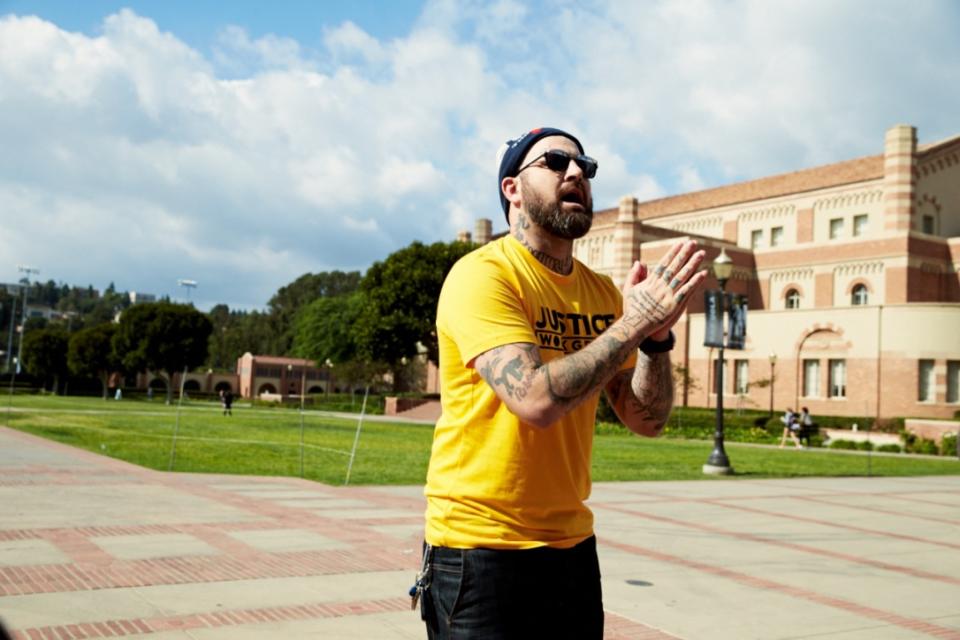

The cops arrested him, but there was a bigger problem than the gun. He had never checked in with his parole officer after getting out of prison, which added up to two no-bail felony warrants. The courts extradited him to San Diego, where the public defender recommended he plead guilty and serve six years, as an alternative to the 10 years he could get if found guilty at trial. In court, Dart, enraged, erupted at the judge. Bailiffs removed him. The judge ordered a psychiatric evaluation.
As a teenager, Good Will Hunting had been one of Dart’s favorite movies, because he identified with the hardscrabble Boston kid played by Matt Damon who cleans the floors at the Massachusetts Institute of Technology, and eventually gets in. That could be me, Dart thought.
He calls the psychiatric evaluation his “Good Will Hunting” moment. “I broke down with the psych dude,” Dart says. “I felt like I was in a hole I could not get out of. I told him, dude, my life is so f***ed. If I had another chance, I would do things so different.” The psychiatric evaluator reported back to the judge, who conferred with the prosecutor and told Dart that instead of prison, he could enroll in a 180-day residential treatment program.
“I went into that program and it just saved my life,” Dart says.
There was still plenty of turmoil ahead. But he began to feel the inkling of a purpose. A counselor named Les Lazerus, who had spent time in the notorious Folsom Prison, asked Dart, if you could do anything, what would you do? The answer: I want to be a rock star. “Then why don’t you start a band,” Lazerus said. So he did.
Dart didn’t play any instruments. But he wrote some songs and found some guys to play with. For their first gig they played three songs at the Cat Club in L.A. on Oct. 1, 2004. It was the end of the night and the bartender was telling them to hurry up so he could close. But Dart began to show relentless entrepreneurial determination by handing out flyers for the band to promote their shows at every joint he could make it to, working the doors until most of the clubs emptied out around 2 a.m. People in the L.A. music scene began to hear about the maniac with the flyers, the mohawk hair, and neck tattoos who fronted a punk band.
The group Circle Jerks was planning a tour and looking for an opening act. Somebody mentioned the flyer kid. The Circle Jerks checked out Dart’s band, Time Again, and signed them up. “We went from playing for 10 people to, a few months later, playing for 2,000,” Dart says. “The first tour happened so fast we didn’t even have a full set of originals.”
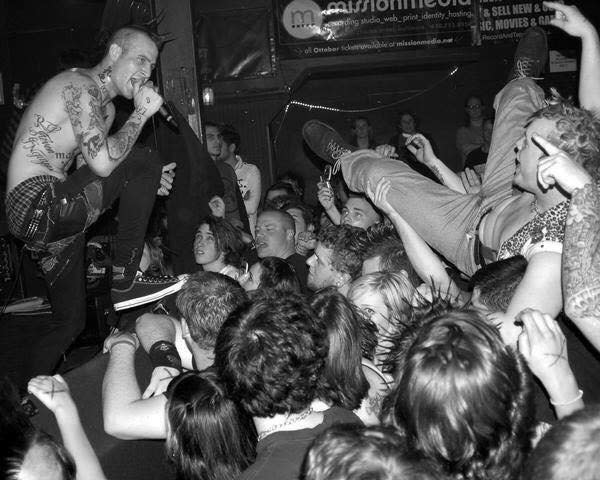

Daniel Dart literally became a rock star touring the world with other bands including the Aquabats, the Unseen, Dropkick Murphys, Flogging Molly, and Offspring. In 2008 and 2009, Time Again played around 200 shows a year, all over the world. The band’s own music became popular. One top song, “The Stories Are True,” currently has 1.9 million streams on Spotify.
Dart was moving well beyond the reentry program that saved him from a second stint in prison. He got married and banked some money for the first time. He stopped drinking, which was his worst addiction. It could have been a storybook success story.
But it wasn’t. “I never knew where I fit in,” Dart says. “It felt so vapid. I loved the creation part but that was only 5% of the career.” He didn’t want to tour anymore, so he stopped. Then his marriage failed and he got divorced. “I was super depressed. And I relapsed. Life was just a disaster.”
That’s how Dart ended up in prison, again.
By 2011, Time Again had stopped touring and Dart started hanging out with his old crowd in L.A., amid the gang economy. He was dating somebody in what he describes as a “disaster relationship.” They were on the verge of breaking up. One night they were drinking, fighting, talking trash to each other. The woman threatened to tell the cops about whatever gang activity he was involved with. He blew it off. Dart had a recording studio and wanted to go there. She had a car. He drove and she came along to drive the car back. But the arguing continued and at one point she demanded he stop and let her out. They were on a highway, so he pulled off at the next exit and she got out. Then he drove to the studio.
A few days later, on Sept. 2, 2011, he was back at the studio, and when he walked out, a swarm of cops arrested him for kidnapping and carjacking. “When they first pulled their guns on me, I thought I was getting shot by a gang,” Dart says. Then the cops started asking what he knew about gangs. He pieced it together. The woman he was dating must have followed through on her threat, and reported his gang involvement to the police. The cops were trying to use the kidnapping and carjacking charges as leverage for prying out intel about gangs. But Dart didn’t have much to offer. “There could be 2,000 members in a gang but only about three you have to worry about,” Dart says. “I wasn’t one of them.”
Dart and his lawyer thought he would beat the charges, but it didn’t work out that way, and the court sentenced him to six years. He appealed the sentence, however — and won the appeal, based on a ruling that there were errors in his plea deal and in the subsequent sentencing. By the time he finally got out, he had spent another three years in prison, passing the time by reading books and newspapers, estimating he plowed through 400,000 pages.
Daniel Dart left prison for the second time on Sept. 5, 2014. He reconnected with his L.A. crowd and went drinking his first night out. Some people got arrested right around the corner from where he was hanging out, and he knew it could just as easily have been him, heading back to prison. He went to AA and finally got sober. I asked him how hard that was. “Getting sober was not really that hard,” he says. “It was either do this program, or go back to prison.”
Once sober, Dart got a job changing the sheets at Airbnb rentals. Then he helped a buddy rent his own apartment on the site, pulling in a few bucks. Toward the end of 2014, Dart was drinking coffee at a café in Hollywood one day when a friend who managed music acts, including Weezer guitarist Brian Bell, walked in. He offered Dart a job, helping manage Bell and a separate band called the Relationship. Dart jumped at it. He turned out to be good at managing bands, and signed a few acts himself.
Then Daniel Dart started his own management company, DEC Artists, which later became DEC Projects as he branched out beyond music. Relentless networking helped him land the Crash Kings, who had a couple of hit songs. He represented the musician Seal in a book and film deal. Then he got interested in social justice issues including gun violence, homelessness, and immigration. Through DEC, Dart handled public awareness campaigns for clients including actor Mark Duplass; the Wounded Warrior Project; Tom Colicchio of Top Chef and his anti-hunger foundation; and the Bezos Family Foundation, run by Amazon founder Jeff Bezos’s parents.
The social justice work took off, and DEC began to enjoy a kind of flywheel effect as one project led to another. He got in the habit of disclosing his prison history up front. When the Bezos foundation approached him about a project, he asked if they knew he had been in prison and was still on parole. The answer was no. They asked if he was likely to go back to prison. He said no. They asked if he could do the work. He said yes. The project went through.
As his reputation for social justice work grew, Dart worked on campaigns for the Obama White House, the AFL-CIO, and other organizations. He hired people to help staff the projects. The United Nations and other international organizations hired him to work on development and refugee issues in Algeria, Ghana, Uganda, Gaza, the West Bank, and other parts of the Middle East. “The refugee stuff resonated with me, because growing up I felt like a refugee, like somebody who never had a home, who was always moving,” Dart says.
He also began to realize that mobilizing capital was essential to improving people’s lives. At an event in Washington, D.C., Dart met Günther Schönleitner, who was executive director of the World Bank at the time. They kept in touch, and Schönleitner, a graduate of the London School of Economics (LSE), eventually suggested that Dart apply to the graduate program there. Dart had a high school equivalency certificate and no college education, but he had taught himself to write research papers he presented at academic conferences. He decided to give it a shot while working on a project for the Saudi Arabian government in Riyadh. Schönleitner wrote a recommendation letter.
LSE said no. Dart had become so fixated on the idea of attending LSE that he wrote a dozen department heads and other administrators asking them to reconsider, arguing that a traditional educational background wasn’t the only path to success anymore. He’s not sure exactly what happened, but it worked. LSE reversed itself and admitted him to its master’s program, making Dart the first student known to matriculate at the storied school without an undergraduate degree.
It was 2020. The COVID pandemic hit, stranding Dart in Saudi Arabia. LSE went remote and he finished the first term without ever stepping foot on campus. It went well, however, and he decided to do a second master’s program. He now has two master’s degrees from LSE, one in international relations and the other in social business and entrepreneurship.
Dart thought about getting a Ph.D., but a friend pointed out that he seemed more interested in running things on the ground than in academic theory. He applied to several MBA programs but MIT’s Sloan School of Management was his main target.
Dart aced the entrance exam but there was a tortuous vetting process, with MIT verifying everything it could about Dart’s legal history and making sure there were no hidden liabilities. Finally, MIT admitted him to its executive MBA program beginning in the fall of 2022. He’ll finish next year.
Along the way, Dart starting doing some work at private equity and venture capital firms to learn how to acquire companies, structure deals, and make money for investors. Inveterate networking opened some doors, but others remained closed to him. One employer withdrew a job offer upon learning about his criminal history. At another firm, he learned that he earned significantly less than others doing the same work. He confronted the boss, who pinned the lower pay on his background. “He was like, ‘Well, we’re trying to give you an opportunity,’” Dart recalls. “’You have a background and we’re letting you in.’ It was horrible. I was so pissed.”
Those types of experiences convinced him to start his own venture capital firm, which is just getting off the ground. It’s called Rock Yard Ventures, after the informal name for his part of his father’s business. His focus is funding tech startups in industries that build things, such as construction, manufacturing, and logistics. He’s starting with $10 million in funding, which is small, but his goal is to grow Rock Yard into the VC equivalent of Josh Friedman’s hugely successful investing firm, Canyon Partners.
During the last 10 years, Daniel Dart has assembled an elite network of contacts and supporters that completely transcend his troubled beginnings. He asks successful people to mentor him and makes sure to keep in touch. I reached out to some of those supporters.
Gary Cohn, vice chairman of IBM and former president of Goldman Sachs, said in an email that “Daniel has overcome so many obstacles in his life. We should all give him credit for his determination.” Cohn is an investor in Rock Yard Ventures.
Billionaire investor John Arnold told me in an interview that “there are a lot of people rooting for him to succeed, given that he’s had a different life trajectory than the standard person in finance.” I asked how the tattoos go over in the staid world of investing. “They’re obviously a conversation starter,” Arnold told me, chuckling. “People know immediately they’re meeting somebody who’s had a different route in life. He lives it and he owns it.”
I asked Jeff Korzenik, who’s chief economist at Fifth Third Bank and a personal investor in Rock Yard, if he sees any unusual risk betting on somebody with a criminal record. He told me it’s the other way around. “Daniel is fearless,” Korzenik says. “All the things he’s overcome in life, they either knock you down or they make you impervious to defeat. When you think of all the hurdles he went through, that’s someone with dedication and resilience.”
Street cred has value, too. “He has an incredible adaptability,” says Johan Bjurman Bergman, who worked with Dart for several months on the Saudi project. “He can go to Skid Row and start a conversation with somebody who’s been homeless for 10 years, then he works his way into the rooms where you’ve met him.” Like seemingly everybody, Bergman met Dart at a conference, where he stood out among the business-casual crowd thanks to his signature beanie and tattoos.
Dart insists he was innocent of the kidnapping and carjacking charges he spent three years in prison for. Yet he recognizes value in the experience. “I can make the case that going to prison is the very best thing that happened to me,” he says. “If there were no repercussions, I’d be dead. I’m glad I got to a place where I got to clean up and reset.”
Scars remain, from the ordeal of childhood trauma and the shock of prison. After getting out of prison the second time, Dart suffered regular panic attacks for a couple of years. He still suffers from anxiety, and told me being the subject of this story caused him considerable anxiety.
So I asked why he agreed to cooperate with me in the first place. “I’m really proud of what I achieved,” he explained. “For many years I just thought I’d never get out of the hole. I remember eating raw potatoes and living weeks and months eating nothing but ramen. Now I feel like it’s bigger than me. For everyone trying to rebuild their life, I want the chance to show people we’re redeemable and worth backing.”
It’s been less than 10 years since Daniel Dart left prison, got sober, and started building a unique, multipronged career. Once he finishes at MIT, he plans to dive full time into his VC firm, maintain his advocacy for “second chance” hiring of former convicts, and maybe teach at MIT or another university on topics related to criminal justice and entrepreneurship. He’s written several new songs and might get his band back together.
Beyond that, how far will he go? I asked one person who has invested with Dart where he’s likely to end up. “He’s a special person who has figured out how to have connections at high levels of finance, government, and international affairs,” the investor told me. “He’s sort of on this upward vacuum. I’m sure there’s a ceiling somewhere, but I don’t see anything he couldn’t do.”
Rick Newman is a senior columnist for Yahoo Finance. Follow him on Twitter at @rickjnewman.
Click here for politics news related to business and money
Read the latest financial and business news from Yahoo Finance

